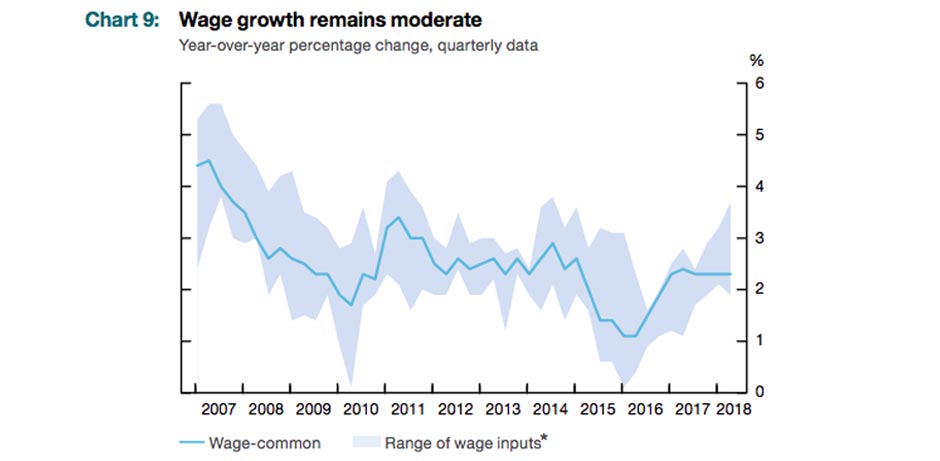
New Data Shows Wages Stagnated and Inequality Grew Even as the Canadian Economy Boomed in 2017
Biggest gains went to the wealthiest 10%, not to working families
Even though Canada’s economy appeared to have a strong performance in 2017, a closer at the data is showing that inequality increased and wages stagnated for working families.
While the Canadian economy boomed with roughly 3% GDP growth in 2017, new data from Statistics Canada shows most of the gains went straight to the top 10% while incomes for average families barely budged.
Here are a few of noteworthy findings from the data:
2017 figures show:
- Average incomes rose just 2.8% in two years.
- Incomes of the top decile rose nearly 5%.
- The top 10% took in a quarter of all growth, while the bottom 40% took in only one-fifth of all growth.
- Pre-tax inequality figures the highest since 2010, after tax inequality figures up as well.
- Since the 1980s, majority of population’s incomes stagnated or fell, while top 1% and 0.1% of earners had their incomes grow at a staggering rate.
Income Growth Sluggish
Adjusted for inflation, the average the after tax income of all families and individuals rose modestly from $71,200 in 2015 to $73,200 in 2017. That’s an increase of 2.8%.
But families in the top decile saw their after-tax incomes rise almost double that. The top decile’s incomes rose 4.786%, from $192,200 in 2016 to $201,400.
Wage Growth Below Inflation
Craig Alexander, senior economist with Delloitte Canada, told PressProgress a key reason for Canada’s sluggish average income growth is sluggish wage growth. “A tight labour market should allow wages to rise but we aren’t seeing much wage growth.”
Likewise, the Financial Post noted:
After several years of good-to-great aggregate employment growth, wages are only keeping pace with inflation
As PressProgress reported previously, despite Finance Minister Morneau bragging about average Canadians getting ahead, the Bank of Canada has noted Canadians’ average wages are stagnant.
And, median hourly wages have done even worse. PressProgress reported, with 5.2% inflation from September 2015 to September 2018, real median wages actually fell 0.3%.

Bank of Canada
Persistent Inequality
Statistics Canada noted Canadians in the highest decile accounted for 23.3% of Canada’s total after-tax income, in 2017.
Meanwhile, the lowest four deciles — the bottom 40% of the population — accounted for only 20.4%.
Likewise, both measures of Canada’s Gini-coefficient (before and after tax) rose in 2017.
Canada’s adjusted market income Gini-coefficient rose, in 2017, to 0.439, its highest point since 2010 when the coefficient hit 0.441.

Statistics Canada
Canada’s adjusted, after-tax income coefficient also rose to 0.309. Despite taxes and transfers that still is an increase in inequality since the first year of the Trudeau government. And, it places Canada in the upper-half of the 35-member OECD.
PressProgress reported previously, between 1981 and 2016, the poorest 10% saw their incomes fall, while middle 50% saw incomes stagnate. But the richest 10% saw their incomes rise 25.4% and the richest 0.1% saw their incomes rise a staggering 125.5%.
And, there are few signs 2018 was much better. As the National Observer reported:
Billionaires in Canada have increased their wealth by $20 billion over the last year, says a new Oxfam report on global inequality. In the same time, the 4.5 per cent of the country’s wealth held by the poorest half of Canadians remained static.
Slower Income Growth, More Inequality to Come?
On Friday, Statistics Canada reported for the whole of 2018, Canada’s GDP grew 1.8 per cent. For 2019, Alexander told PressProgress he anticipates a further slowing.
“We know economies go through regular fluctuations from recession to recovery and then expansion. We had recessions in the early 1970s, and the early 1980s and 2001 and 2008. It basically tells you the economic cycle lasts about ten years. And we’re about ten years since the last recession,” he told PressProgress.
Alexander cautioned it’s possible a delayed recovery means a delayed contraction. “But, at the ten year mark you have to acknowledge that we’ve gone a long way. In the next three to five years, we’re probably due for another downturn.”
What does that mean for incomes?
Conference Board of Canada economics director Matthew Stewart told PressProgress “With concerns over the economy we will likely see continuing softness in wage growth and with that continuing weakness in total incomes.”
Inequality would likely rise should the slowdown continue, as well.
Dalhousie University economics professor Lars Osberg told PressProgress “Increases in unemployment, decreases in overtime hours and cutbacks in hiring are predictable consequences of slowing GDP growth. All of these disproportionately impact the lower middle class. So an index of inequality such as the Gini will tend to go up.”
Our journalism is powered by readers like you.
We’re an award-winning non-profit news organization that covers topics like social and economic inequality, big business and labour, and right-wing extremism.
Help us build so we can bring to light stories that don’t get the attention they deserve from Canada’s big corporate media outlets.
Donate



